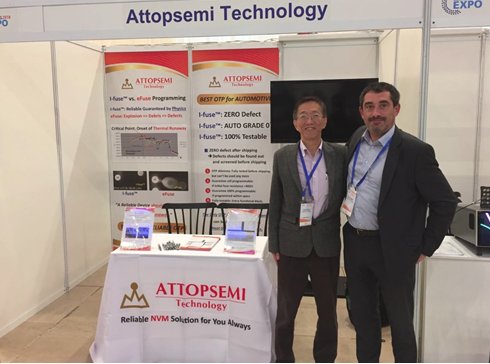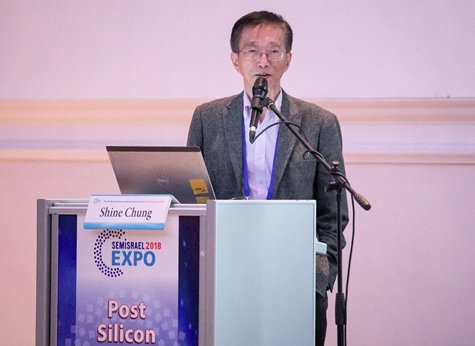Attopsemi Technology Attended SemIsrael 2018 and Presented a Talk “100% Testable OTP for Automotive”
Hsinchu, Taiwan –December 20, 2018
Attopsemi Technology attended SemIsrael on November 27, 2018 in Tel Aviv, Israel and provided a talk “100% Testable OTP for Automotive.” More than 40 semiconductor chip and IP companies worldwide joined this event that attracted several hundreds of attendees.
In a well-received speech during the Technical Session, Shine Chung, Chairman of Attopsemi, presented the topic “100% Testable OTP for Automotive.” In the automotive IC market, high reliability and low defects are two crucial features to avoid malfunctions and loss of lives. High reliability means that a good part can still be maintained in a good condition after using for long time. Low defects mean any faulty parts should be screened out before shipping to customers. I-fuse™ is a revolutionary “non-explosive” fuse technology that can be programmed below thermal runaway and above electro-migration (EM) threshold. This is different from other kinds of fuse technologies which are “explosive” during programming. On the contrary, I-fuse™ programming follows the physics, which is based on heat generation, heat dissipation, and electro-migration. The reliability of Attopsemi’s I-fuse™ is guaranteed by physics.
To ultimately achieve ZERO defect, OTP needs to be tested thoroughly to toss away every defective part. However, conventional OTP always struggled in a dilemma. Ideally, every OTP bit should be test programmed at least once to make sure bit can be programmable. Unfortunately, if that one bit has been programmed during test, the OTP macro cannot be used any more. Moreover since all bits will be read as 0 in a blank OTP, any internal blocks of OTP can not be tested if they are stuck at 0. If every bit cannot be fully test programmability, it would be nearly impossible to avoid yield loss when programming OTP in field.
Fortunately, I-fuse™ can solve the OTP testability issues completely. As we stated previously, I-fuse™ programming is based on heat assistant electro-migration. If an initial I-fuse™ resistance is tested below 400 ohm, for example, this I-fuse™ can surely generate enough heat to be programmable. Furthermore, since I-fuse™ program window will be characterized before being used, I-fuse™ programming yield can be estimated very accurately and the program yield can be nearly 100%, if programmed within the provided spec. Finally, every I-fuse™ functional block, such as I-fuse™ cell, array, X/Y-decoder, sense amplifier, control logic, and program circuits can be fully tested by generating a non-destructive programming state to make it temporary be read as 1. To achieve fake reading 1 for a blank OTP, we will apply a low voltage to VDDP pin in the program mode while reading this bit. With a low voltage applied in the selected bitline, the selected bit for “program” can be read as 1, instead of 0. As a result, many complicated SRAM-like of test patterns can be fully testable.
“Automotive ICs always have a goal to achieve ZERO defect.” explained by Shine Chung. “ZERO defect means no defect after shipping because of high cost for field return. Any defects should be fully tested and screened away before shipping. Therefore, testability is essential to reach this Holy Grail. Only I-fuse™ among all OTP technologies can reach this goal.”

Shine Chung, Chairman of Attopsemi (left) attended SemIsrael 2018 at Attopsemi’s Booth in Israel.

Shine Chung, Chairman of Attopsemi provided a talk “100% Testable OTP for Automotive.”
